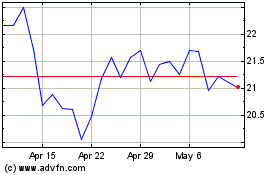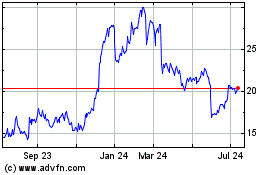Intel Supplying Wireless Chips for Some Apple iPhones
September 09 2016 - 12:30PM
Dow Jones News
Apple Inc. is using wireless chips from Intel Corp. in some
models of the new iPhone 7, people familiar with the matter said, a
widely expected breakthrough in the chip giant's multiyear quest to
find a foothold in popular smartphones.
The Intel baseband modem chips are a replacement for those sold
by Qualcomm Inc., a longtime Apple supplier which is expected to
supply wireless chips for the remainder of the iPhone 7 handsets.
Some analysts believe that Intel could wind up supplying chips for
as much as half the handsets Apple is likely to sell.
Intel's milestone, following years of failures in the mobile
market, isn't a surprise. One reason is that Qualcomm managers had
signaled earlier in the year that they expected to lose some iPhone
chip sales. Bloomberg in June reported that Intel would win a share
of modem sales in the next iPhone.
But some component choices often aren't confirmed until research
firms have a chance to disassemble new devices after they go on
sale. Industry executives say decisions can change at the last
minute as companies conduct final negotiations over pricing and
other terms.
Apple provided new clues Wednesday about its decision along with
specifications for the iPhone 7, which is scheduled to appear in
stores Sept. 16. The company disclosed that some models don't
support a cellular technology called CDMA, or code-division
multiple access, which is used in some cellular networks and not
others. In the U.S., the Verizon Communications Inc. and Sprint
Corp. networks make use of CDMA, while AT&T Inc. and T-Mobile
US. Inc. use different technology.
Qualcomm, which helped popularize CDMA, builds in support for
the technology in all its baseband chips, while Intel doesn't.
Consequently, analysts interpreted the non-CDMA models as powered
by Intel chips and that models that work on the other networks use
Qualcomm chips.
Those specifications are "the leading indicator" that Intel
technology is in some handsets, said Patrick Moorhead, an analyst
at Moor Insights Strategy.
Intel and Qualcomm representatives declined to comment. So did
Philip Schiller, Apple's senior vice president of marketing, during
an interview at the event Wednesday.
Apple, like other device makers, has an interest in establishing
at least two suppliers of key components, said Timothy Arcuri, an
analyst at Cowen Co. Besides providing a backup supply in case of
manufacturing problems, multiple suppliers benefit a company like
Apple by competing on price and features.
"The last major component that was not dual-sourced was the
baseband," Mr. Arcuri said.
Write to Don Clark at don.clark@wsj.com
(END) Dow Jones Newswires
September 09, 2016 12:15 ET (16:15 GMT)
Copyright (c) 2016 Dow Jones & Company, Inc.
SentinelOne (NYSE:S)
Historical Stock Chart
From Mar 2024 to Apr 2024

SentinelOne (NYSE:S)
Historical Stock Chart
From Apr 2023 to Apr 2024
